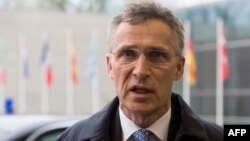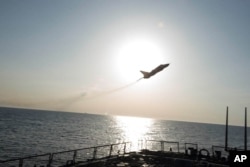The NATO-Russia Council met Wednesday for the first time since 2014, but the two sides failed to overcome their disagreements over key issues.
Ambassadors from the 28 NATO countries attended the meeting in Brussels, along with a Russian delegation.
The talks were "frank, serious and actually good," NATO Secretary-General Jens Stoltenberg told reporters after the meeting.
Still, he said NATO and Russia "have profound and persistent disagreements"' and that Wednesday's meeting "did not change that."
Stoltenberg said the NATO members made clear during the meeting that "they stand firm in their support for Ukraine’s sovereignty and territorial integrity" and “do not recognize Russia’s illegal annexation of Crimea."
He said they also stressed that the "increase in cease-fire violations in eastern Ukraine in recent days" and a recent incident targeting Organization for Security and Cooperation in Europe monitors there were "deeply disturbing."
However, the NATO chief added that all 29 council members agreed "on the need for a full and rapid implementation of the Minsk agreements" signed in 2014 to bring an end to the conflict in Ukraine.
Earlier Wednesday, before the council met, Stoltenberg said the meeting would be especially important because of last week's incidents in which the United States accused Russian warplanes of flying extremely close to a U.S. Navy warship in the Baltic Sea.
Russia's ambassador to NATO Alexander Grushko, who attended Wednesday's NATO-Russia Council meeting, said the Russian planes had buzzed the USS Donald Cook because it sailed near Kaliningrad, a Russian exclave on northern Europe's Baltic Sea coast.
The ship's presence there, he said, was an "attempt to exert pressure on Russia," adding that Russia would "take all necessary precautionary measures in response to this attempted use of military force."
Relations between Russia and NATO members froze after Russia annexed part of eastern Ukraine and an armed conflict began between Ukrainian government forces and pro-Russia separatists.






